I used to think Excel was “good enough” for recruiting—until I forgot to follow up with a top candidate and lost them to a competitor. That was the wake-up call.
If you’ve ever bounced between spreadsheets, endless email threads, and hiring manager updates across six tabs, you already know: chaos kills good hires. That’s exactly why finding the best CRM for recruiters isn’t just a tech decision—it’s a strategic advantage.
Over the years, I’ve tested and implemented dozens of CRMs—some brilliant, some bloated, and a few that actually made life harder. Whether you’re a solo consultant, an HR lead, or running a hiring agency, I’m breaking down the 8 recruitment CRMs that truly make a difference.
If you’re curious about how a CRM can help you in the recruitment process, check out this quick video –
8 Best CRM for Recruitment Teams
To compile this list, I have assessed each tool’s ease of use and scalability, ensuring they meet recruiters’ diverse needs.
My evaluation includes my personal experiences, insights from reputable reviews, and feedback from industry peers.
| CRM | Best For | Pricing |
|---|---|---|
| BIGContacts | Contact Management & Email Marketing for Small & Medium Businesses | Forever free plan for small teams. Paid starts at $9.99/month. |
| Recruiterflow | Applicant Tracking (Automation & ATS) | Starts at $99/user/month. |
| Hubspot | All-in-One Marketing, Sales & Service | Starts at $15/user/month. |
| Recruit CRM | Job Posting Automation | Starts at $3000/user/month. |
| Manatal | AI-Powered Recruitment (Automation) | Starts at $19/user/month. |
| Greenhouse | Hiring Automation & Team Collaboration | Custom pricing. |
| ClearCompany | Performance Management (Integrated HR suite) | Custom pricing. |
| Bullhorn | Candidate Engagement & Onboarding | Custom pricing. |
1. BIGContacts – Best for Contact Management & Email Marketing for Startups & Small & Medium Businesses
When I first started using BIGContacts, it felt like a breath of fresh air compared to messy spreadsheets. The system made it incredibly easy to organize contacts, segment leads, and follow up on follow-ups. Its seamless email marketing integration allowed me to send personalized campaigns without switching tools.
It was just as effective for recruitment. I could store candidate details, track every interaction, and manage communication—all in one place. The real-time activity timeline kept my team aligned and ensured timely, personalized outreach for a better candidate experience.
Getting started was quick and painless. I began seeing value within a week, and for small teams, the forever-free plan is a huge plus.
Ideal for: Startups and small-to-medium businesses that need an easy-to-use CRM for managing contacts and email campaigns, without breaking the bank.
Pros:
- Powerful email marketing features designed to conduct lead nurturing and boost conversion rates.
- Complete, real-time overview of all contacts and interactions, improving both visibility and efficiency.
- Automated drip campaigns that adjust based on where each contact is in the sales process.
- Seamless web form integration for effortless lead capture and data collection.
- Awesome human support 24/7 via phone, chat, and knowledge base.
- The interface is user-friendly and helps navigate easily.
Cons:
- No downloadable or on-premise version.
- No dedicated account manager for the free plan, unlike the paid plan.
Pricing:
Forever free for small teams. Paid starts at $9.99/month
User Reviews:
“BIGContacts seems to be the best way to extract data. Contact information has all the addresses, tasks, and notes in one place, making it easier for everyone to keep track of what is going on with each company.” — Melanie P., Manager (G2)
2. Recruiterflow – Best for Applicant Tracking & Automation
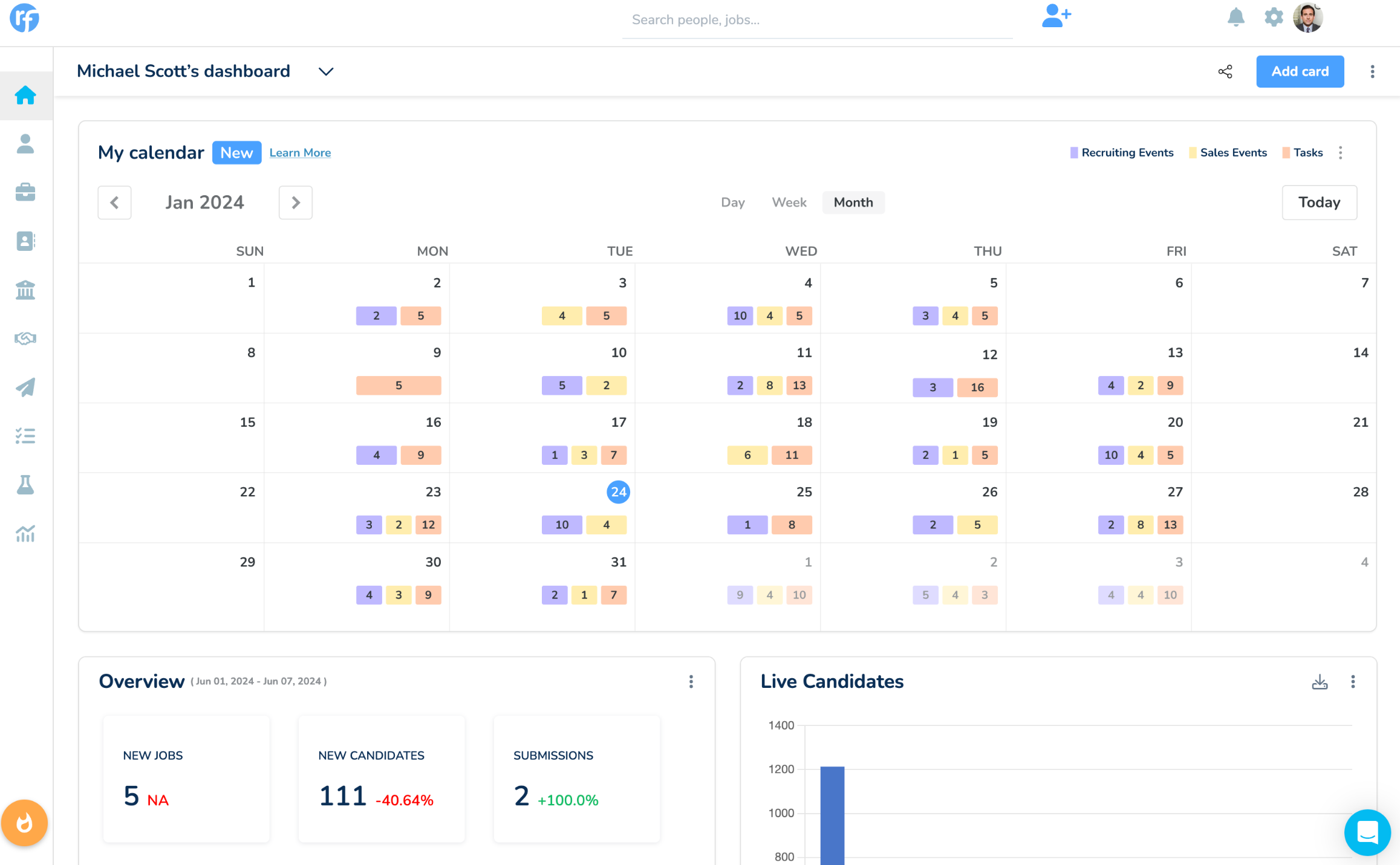
When I worked with Recruiterflow, its smooth applicant tracking and built-in CRM features instantly impressed me. I could manage job postings, candidate pipelines, and even client relationships—all from one dashboard. The drag-and-drop interface made tracking candidates through the hiring stages simple and intuitive.
What stood out most was the automation. I set up follow-up email sequences, interview reminders, and even LinkedIn outreach, all running in the background. This saved me hours and ensured timely, personalized communication without any manual tracking—hugely improving the candidate experience.
The LinkedIn Chrome extension was another helpful feature—one click, and I could add candidates straight into the system. Whether I was sourcing, interviewing, or collaborating with my team, Recruiterflow gave me full control over every step of the funnel.
Ideal for: Recruiting and staffing agencies that need an all-in-one ATS + CRM to attract, organize, and manage candidates (and clients) efficiently.
Pros:
- Intuitive drag-and-drop interface for managing candidate pipelines, making it easy to manage the recruitment process
- Automated email sequences for better candidate engagement, ensuring timely follow-ups
- Customizable workflows to fit specific recruitment needs, ensuring flexibility for different hiring processes
- Built-in reporting tools to track recruitment metrics, helping recruiters make data-driven decisions
Cons:
- Some users reported issues with the integration setup
- The mobile version lacks full functionality compared to the desktop version
Pricing:
Starts at $99/user/month.
User Reviews:
“RecruiterFlow has made my life so much easier by keeping everything organized and automating tasks like candidate outreach. It’s saved me so much time and lets me focus on connecting with great talent and helping them find the right opportunities!” — Ivona M., Administrative Coordinator (G2)
3. HubSpot CRM – Best for All-in-One Marketing, Sales & Service
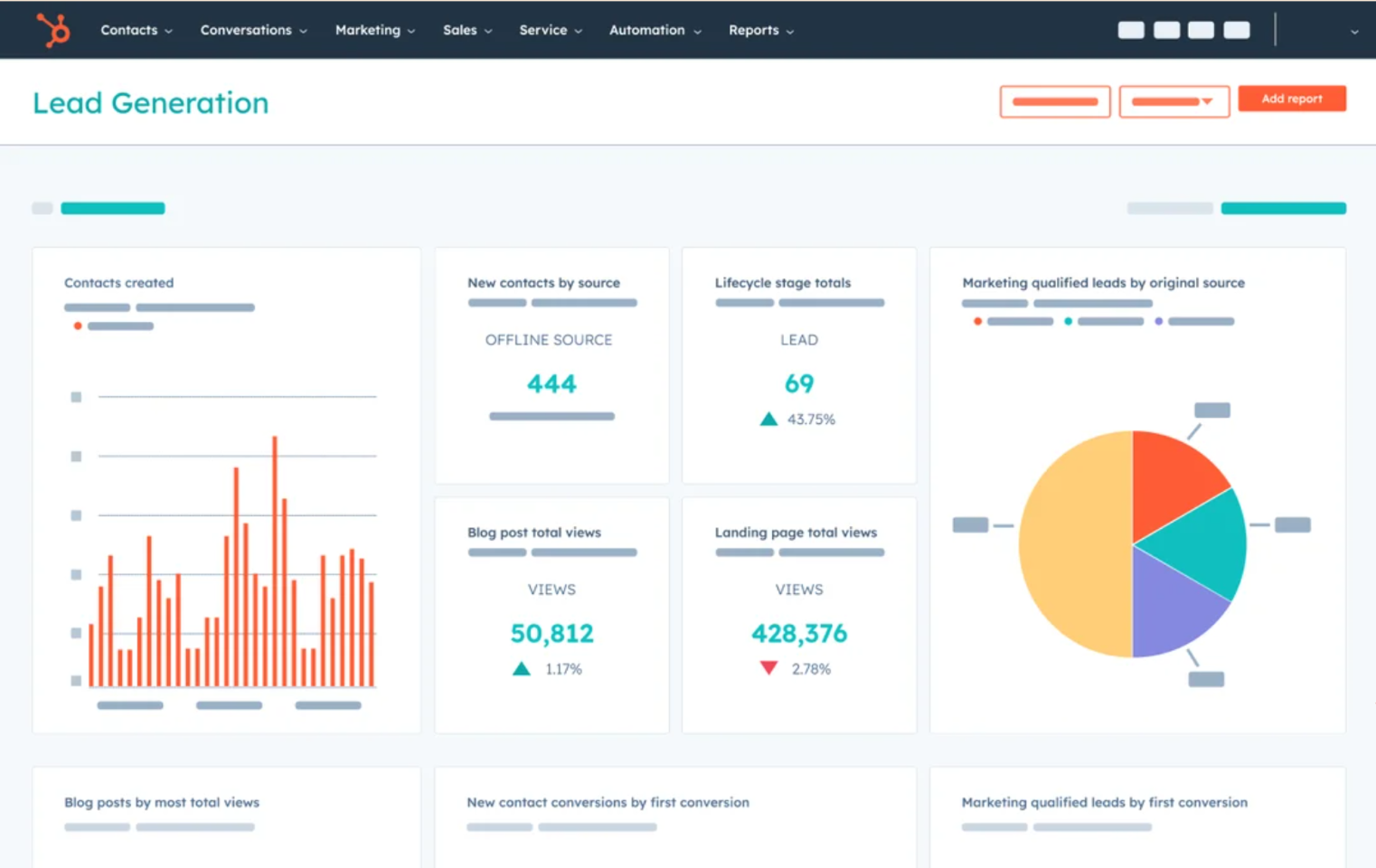
When I started using HubSpot, I was looking for more than just a CRM for recruiting—I needed something that could also handle marketing, client outreach, and business development. While it’s not a recruitment-specific platform, its flexibility made it a great fit. I began with the free plan, and even then, it helped me ditch spreadsheets and organize all contacts in one place.
For recruiting, I treated candidates and clients as “contacts” and used custom properties and pipelines to track each stage. The full communication history—emails, notes, meetings—was always at my fingertips, making calls and follow-ups highly personalized. It felt like having a cheat sheet for every conversation.
What really stood out was HubSpot’s marketing automation. I used it to send targeted campaigns to passive candidates or client newsletters, then tracked engagement through open and click rates. With email templates, scheduling, and integrations with ATS tools via Zapier, HubSpot proved to be a solid option for recruiters who need an all-in-one system.
Ideal for: Businesses (including recruiting firms) seeking an all-in-one platform that combines marketing, sales, and customer service tools – and who may benefit from a free entry-level CRM with upgrade options.
Pros:
- Easy-to-use email automation with personalized templates, helping streamline communication with candidates and clients
- Customizable pipelines to suit various workflows, especially for recruitment, ensuring smoother candidate tracking and management
- Strong lead-tracking features that make candidate management smoother, helping you quickly engage with top candidates
- Candidate segmentation tools that help in organizing and targeting different talent pools for more effective outreach
Cons:
- Customer support may not always provide quick solutions during peak times
- Importing large volumes of candidate data can be time-consuming and requires manual adjustments
Pricing:
Starts at $15/user/month.
User Reviews:
“HubSpot has completely transformed the way we handle marketing, sales, and customer service. The platform is incredibly intuitive, making it easy to manage campaigns, track leads, and automate workflows.” — Margaret J., Sales Development Representative (G2)
4. Recruit CRM – Best for Job Posting Automation
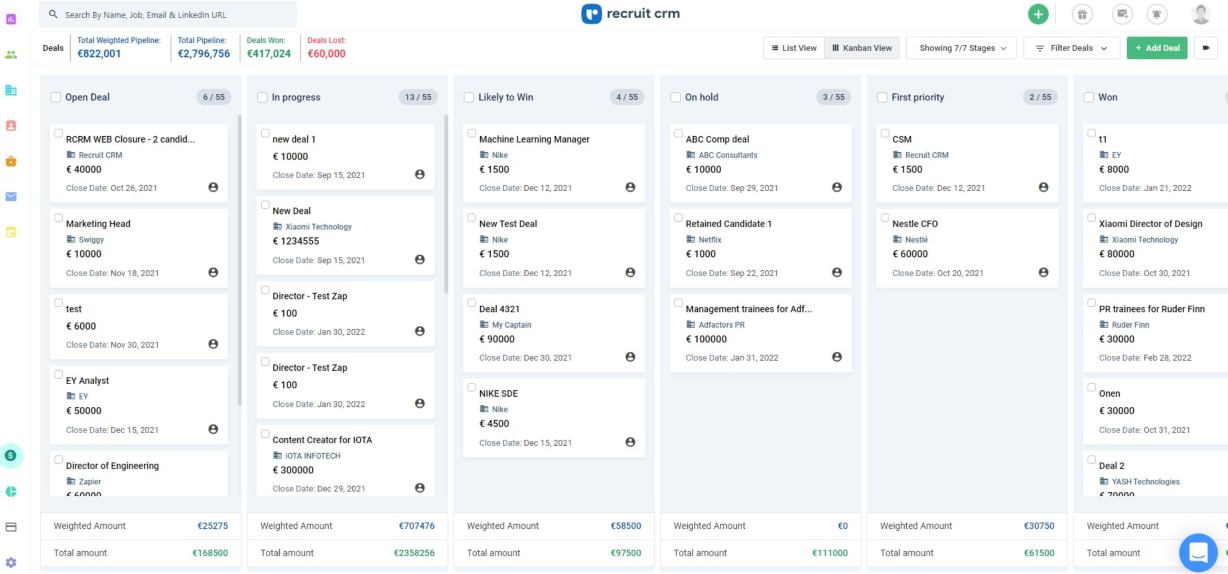
From the moment I started using Recruit CRM, I noticed a sharp uptick in how efficiently we handled hiring. It’s designed specifically for recruitment agencies, combining ATS and CRM features in one clean interface. The job posting automation alone was a game changer—I could post to LinkedIn, Indeed, and niche job boards with just a couple of clicks.
Every applicant, no matter the source, flowed directly into the database with parsed resumes and ready-to-go profiles. The system made it easy to move candidates through stages, schedule interviews, and even generate offer letters. Having the entire recruitment lifecycle—from sourcing to placement—in one place made things incredibly smooth.
What stood out most was how customizable and scalable Recruit CRM is. As our team grew, we could easily manage roles and permissions, keeping everything secure and organized. Plus, onboarding was a breeze thanks to our dedicated account manager who helped us migrate data and tailor the setup to fit our exact workflow.
Ideal for: Small and mid-sized recruitment agencies that want a unified platform to manage job postings, candidates, and client relationships, with an emphasis on ease of use and scalability.
Pros:
- Automatic job posting to multiple platforms to save time and ensure wider reach to potential candidates
- Built-in email templates for faster communication, helping you save time while maintaining consistent messaging
- Customizable recruitment pipelines to tailor the hiring process to fit your unique workflow, ensuring better organization and efficiency
- Intuitive dashboard with real-time updates, allowing you to monitor recruitment progress effortlessly
Cons:
- Customer support response times could be quicker
- Workflow automation is useful but can be a bit complex to set up initially
Pricing:
Starts at $3000/user/month.
User Reviews:
“I found Recruit CRM’s system to be intuitive and easy to use. It has made our transition to using an ATS/CRM much smoother, and their support team has been exceptionally helpful and supportive in getting us up and running!” — Joslyn O., Executive VP & Partner (G2)
5. Manatal – Best for AI-Powered Recruitment
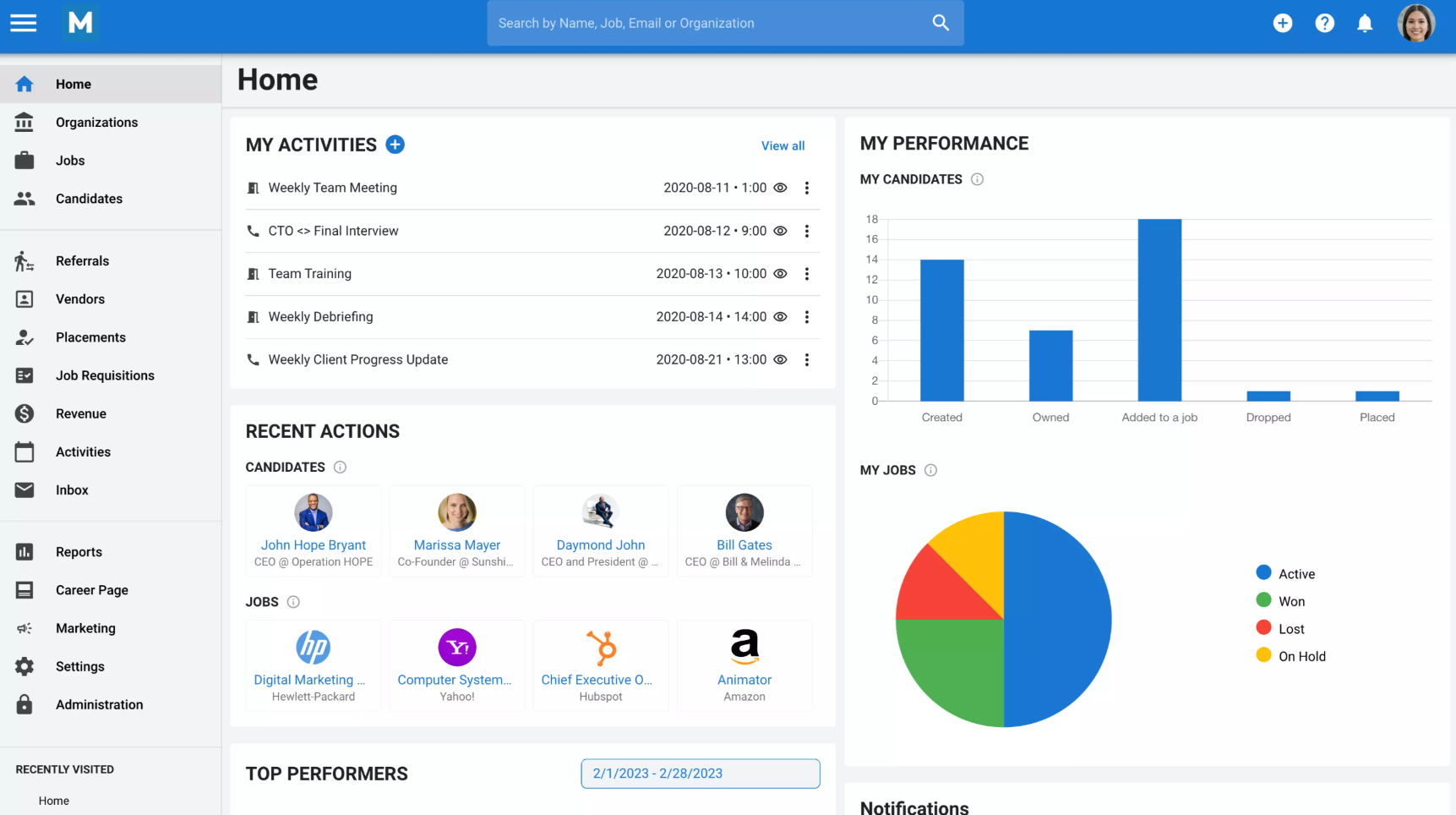
Manatal felt less like software and more like having an AI assistant embedded in my hiring process. Its drag-and-drop pipeline was super intuitive—like using Trello for recruiting. But what really stood out was how smart the AI recommendations were. The platform didn’t just help me organize candidates—it actually suggested which ones to prioritize.
I once uploaded 50 resumes for a tech role, and Manatal’s AI shortlisted the top 5 matches instantly based on job requirements and enriched candidate data. One of those five ended up being the hire. It wasn’t replacing my judgment—it just helped me focus my time on the best-fit candidates faster.
Manatal also pulled in social data (LinkedIn, GitHub, etc.), giving me a full picture of each applicant. My team loved the collaboration tools—we could leave comments on profiles, tag each other, and stay aligned. And despite all the power under the hood, the interface stayed clean and easy to navigate.
Ideal for: Recruiters and HR teams that want to leverage AI recommendations and automation in their hiring process, while keeping things user-friendly and budget-friendly.
Pros:
- Advanced AI-powered candidate recommendation engine to automatically identify top candidates for each role
- Intuitive drag-and-drop recruitment pipeline for easily managing candidates through stages
- Built-in diversity and inclusion features for fair hiring, ensuring a more balanced and unbiased recruitment process
- Centralized Recruitment CRM for tracking candidate progress, ensuring smooth communication, and reducing the risk of losing top talent
Cons:
- The AI recommendation engine may occasionally miss niche candidates for specialized roles
- Reporting features are basic, lacking in-depth data insights and advanced analytics
Pricing:
Starts at $19/user/month.
User Reviews:
“Manatal keeps everything organized from candidate tracking to client communication and saves time on repetitive tasks. It’s a solid platform that helps me stay focused on finding the right talent instead of dealing with admin work.” — Elodie M., Recruitment Consultant (G2)
6. Greenhouse – Best for Hiring Automation & Team Collaboration
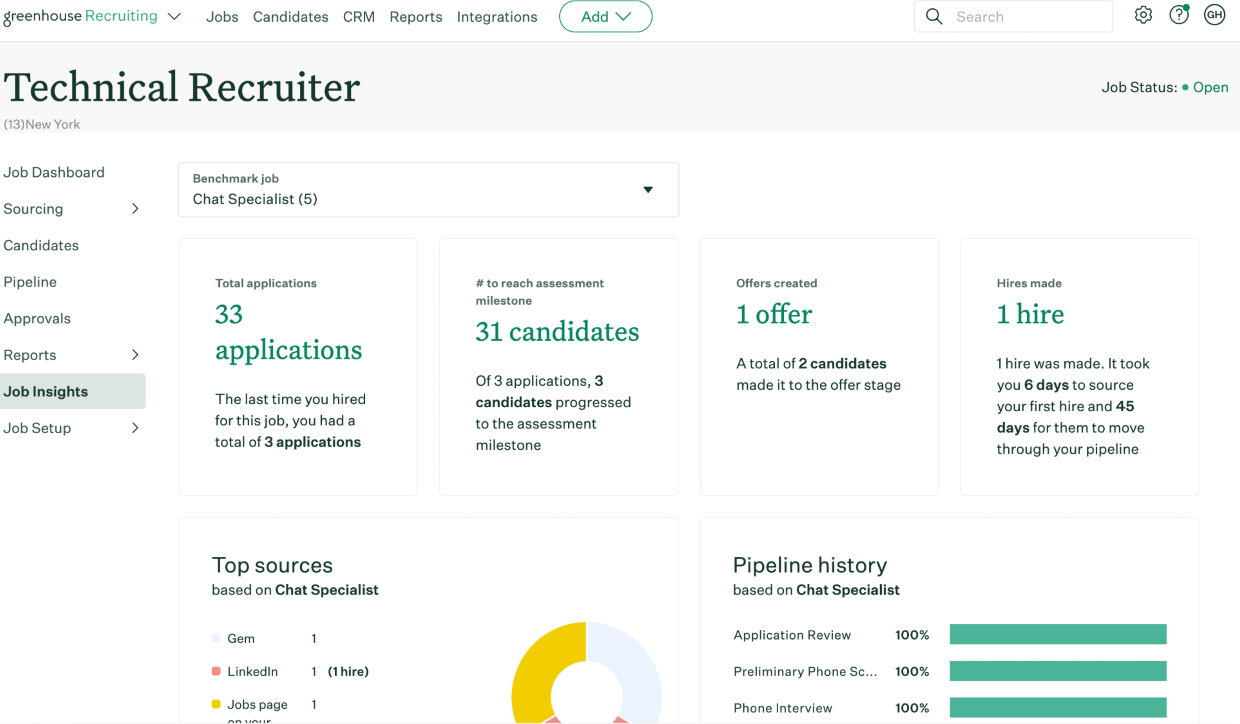
Greenhouse is one of the most comprehensive recruitment platforms I’ve ever used. When I started handling high volumes of candidates across different roles, it was the one tool that helped me stay in control. It’s more than just an ATS—it felt like a full operating system for hiring, covering everything from job approvals to onboarding.
I especially appreciated how much I could automate. For example, when I moved a candidate to the “onsite interview” stage, Greenhouse automatically sent them a personalized email with interview slots (synced to my calendar) and even included travel directions. It also reminded interviewers to submit scorecards, which saved me hours of manual coordination.
What I loved most was the collaboration and visibility. I could assign roles, send prep kits, and see everyone’s feedback in one place after each interview. No chasing people on Slack. And the data insights? Super useful. Greenhouse helped me identify bottlenecks, like interview scheduling delays.
Ideal for: Growing companies and talent acquisition teams looking for a comprehensive hiring platform that emphasizes structured hiring, collaboration, and automation, often used in mid-sized to large organizations.
Pros:
- Automated interview scheduling and reminders to ensure candidates and teams stay on track without manual follow-ups
- Customizable scorecards for consistent evaluations and to streamline decision-making
- Automated resume scanning that speeds up initial candidate screening
- Candidate communication tracking to ensure timely follow-ups and maintain engagement
Cons:
- Interview scheduling can be slow when handling a high volume of candidates
- Lacks built-in video interviewing capabilities, requiring third-party integrations
Pricing:
Custom pricing (varies by plan).
User Reviews:
“Greenhouse has made a noticeable difference in how we attract and hire talent. It’s efficient, flexible, and supports the kind of structured process that’s essential in a compliance-driven industry like ours. We tailored different hiring stages for various roles, and it integrates well with tools we use (DocuSign, Microsoft, LinkedIn).” — Madison S., People & Culture Specialist (G2)
7. ClearCompany – Best for Performance Management (All-in-One Talent Suite)
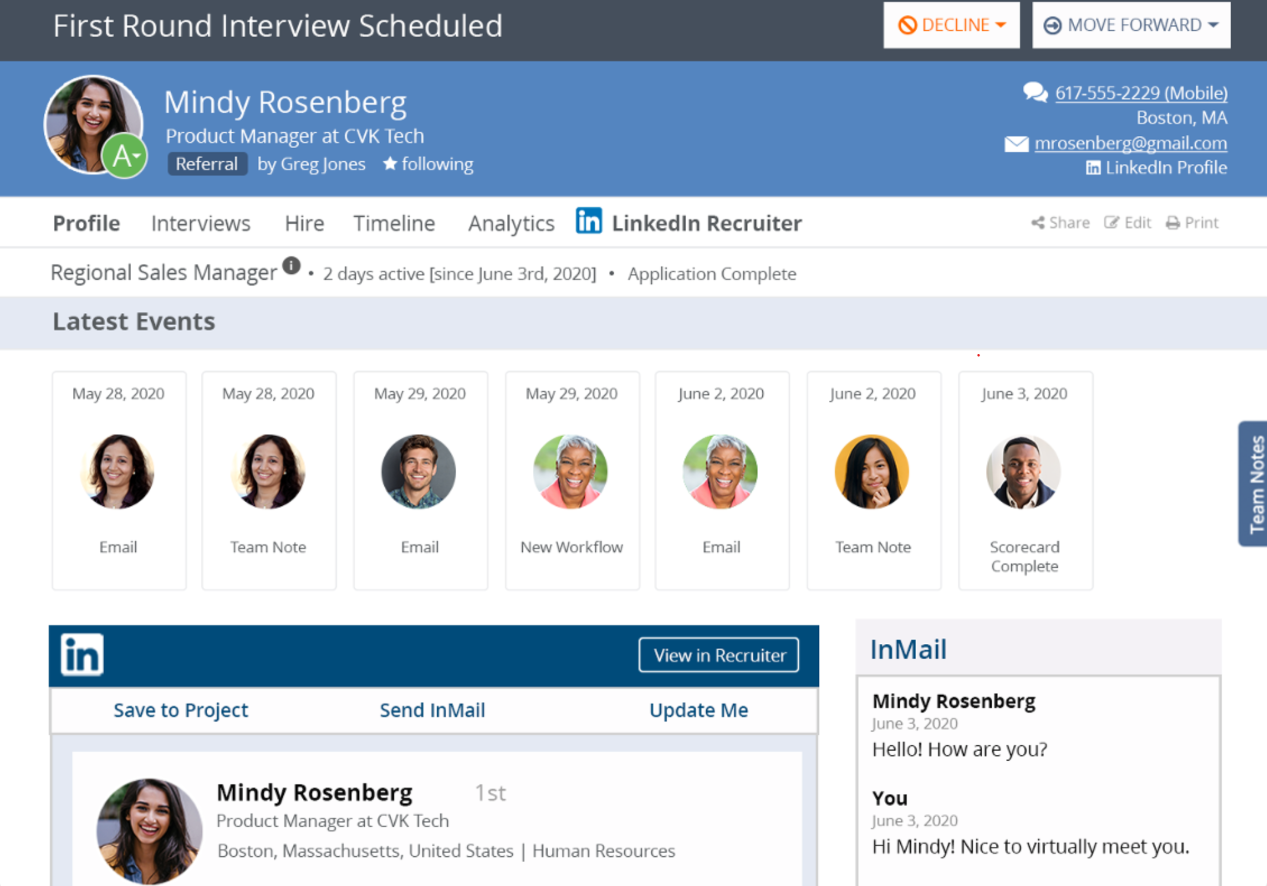
In my experience, ClearCompany isn’t just a recruitment tool—it’s a full talent management system that follows the employee journey from hiring to performance. When I implemented it, I was able to replace three separate systems: our ATS, onboarding software, and performance review tool. Having everything in one place saved me time and ensured consistency.
During hiring, I found ClearCompany’s ATS solid and easy to use. It handled job postings, pipeline tracking, and interview scheduling without much fuss. While it didn’t have all the extras that tools like Greenhouse offer, it got the job done smoothly and didn’t overwhelm new users.
What really impressed me came after the hire. I could send offer letters, collect e-signatures, and then roll straight into performance reviews—all within the same platform. I once hired a sales rep and evaluated them on “communication” and “resilience” during interviews. Those exact traits carried into their 30-60-90 day plan and first review. That kind of alignment helped me measure if I’d made the right hiring call.
Ideal for: Organizations that want to unify their recruitment, onboarding, and performance management into one platform – especially those focused on continuous talent development and alignment with company goals.
Pros:
- Tracks goals that align individual performance with company objectives to ensure employees stay focused on key priorities
- Flexible templates for performance reviews and assessments to tailor evaluations to your team’s needs
- Automated reminders for performance reviews for timely feedback and goal updates
- Comprehensive talent management suite, streamlining recruitment, onboarding, and employee development in one platform
Cons:
- Fewer third-party integrations with non-HR software limit flexibility for businesses with diverse toolsets
- Occasional system slowdowns during peak usage affect user experience and overall efficiency
Pricing:
Custom pricing.
User Reviews:
“ClearCompany is an easy-to-use product with a lot of functionality, a great user experience, and the reporting is the best that I have seen! The implementation was smooth, and the team was very supportive. It’s great to have our ATS and performance management in one place – recruiting, onboarding, and reviews all talk to each other.” — (Capterra review, 2025)
8. Bullhorn – Best for Candidate Engagement & Onboarding
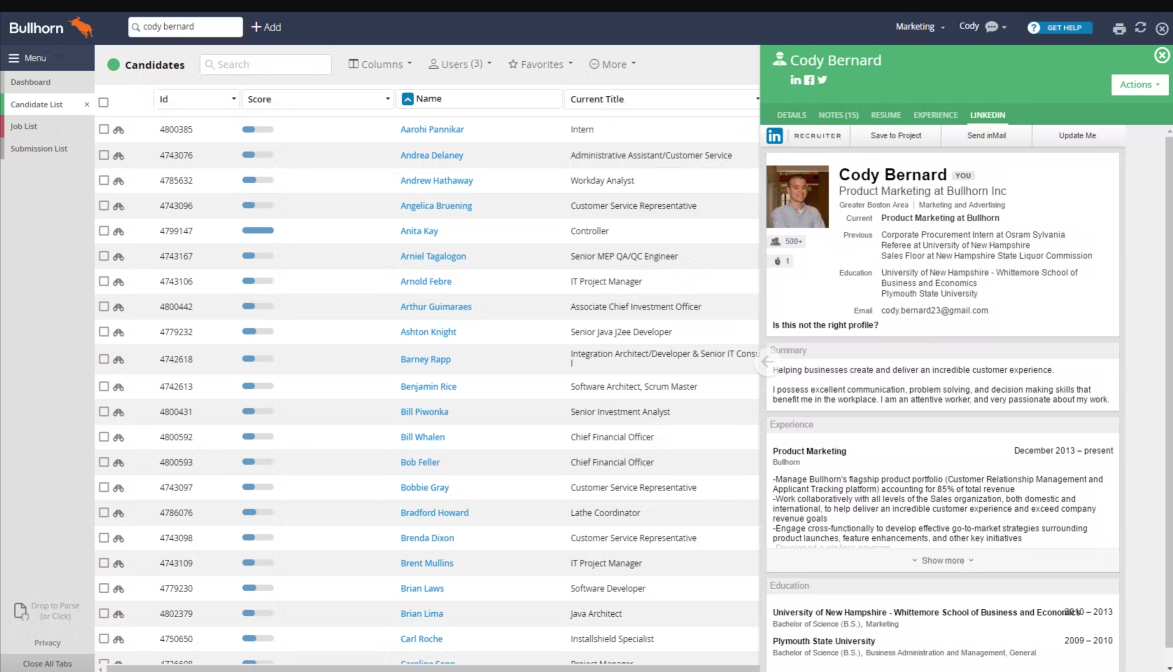
From my experience, Bullhorn has been a gold standard for staffing and recruiting agencies. When I helped implement it at a firm I consulted for, it completely streamlined our chaotic processes. Managing candidates and client job orders became far more organized, and it felt like Bullhorn was built by recruiters—for recruiters.
What I loved most were the automated workflows. When I moved a candidate to “Submitted to Client,” Bullhorn would update the client record, schedule a follow-up task for me, and send an email to the candidate—all automatically. That kind of automation kept candidates in the loop and saved me from manually managing a dozen reminders.
Bullhorn also made onboarding smooth. Once someone was placed, I could handle all post-hire steps—paperwork, background checks, start dates—without leaving the platform. Having the full history of every candidate in one place helped me build long-term relationships, track every touchpoint, and stay top-of-mind for re-placements or referrals.
Ideal for: Staffing and recruiting agencies (and enterprise HR teams) that need a robust ATS & CRM with strong workflow automation, built specifically to handle high volumes of candidates and client interactions, including onboarding processes.
Pros:
- Integrated ATS to manage resume and profile reviews, saving time while improving candidate selection efficiency
- Multi-channel communication to boost candidate engagement by reaching them through their preferred platforms
- Onboarding tools that meticulously track each step from offer to start date, ensuring a smooth transition for both candidates and recruiters
- Intuitive dashboard to offer a clear view of the recruitment pipeline, helping you stay on top of every candidate’s progress
Cons:
- The search functionality wasn’t as effective, making it difficult to find specific candidate profiles quickly
- The interface felt outdated and less user-friendly compared to newer recruitment tools
Pricing:
Custom pricing.
User Reviews:
“Bullhorn has truly transformed the way our team manages the recruitment process. From its intuitive user interface to its powerful automation capabilities, Bullhorn streamlines everything — from candidate sourcing and tracking to client communication and reporting. ” — Meg M., Account Executive (G2)
Quick Overview: My Top 3 CRM for Recruiters
If you’re short on time, here’s a quick look at my top three picks and why I chose them:
#1: BIGContacts
Ideal for startups and SMBs, BIGContacts excels at contact management and email marketing. It helps you stay organized and nurture relationships with ease. (A forever-free plan is available, so it’s a low-risk option to try.)
#2: Recruiterflow
A powerhouse for applicant tracking. This tool helps you attract, organize, and manage candidates efficiently with automation. While it offers an excellent feature set (LinkedIn integration, email sequences, etc.), some users find the interface slightly complex.
#3. Greenhouse
Perfect for teams looking to automate hiring and improve collaboration. Greenhouse streamlines the entire hiring process, from sourcing to onboarding, with structured workflows. It’s very robust, though it may come with a steep learning curve and custom pricing.
Evaluation Criteria for Choosing These CRM Tools
To compile this list of the best CRMs for recruiters, I used a systematic, real-world approach focused on what actually matters during hiring. Here’s what I looked at:
1. User Reviews & Ratings: I relied heavily on recruiter feedback from G2 and Capterra. Reviews revealed time-saving features (like BIGContacts’ automation) and real-world pain points (e.g., Recruiterflow’s impact on streamlining processes).
2. Features & Functionality: I focused on CRM features that truly support recruiting, like candidate tracking, automation, social media integrations, and compliance support. Tools like Manatal (for AI matching) and Bullhorn (for an ATS + CRM combo) stood out here.
3. Ease of Use: I evaluated how intuitive and beginner-friendly each platform is. Tools like BIGContacts and Manatal are quick to learn, while Greenhouse or Bullhorn offer deeper functionality but come with steeper learning curves.
4. Customer Support: Good support makes implementation smoother. I noted things like 24/7 chat, onboarding help, and account managers. BIGContacts and Recruit CRM scored well in terms of their proactive support.
5. Value for Money: I assessed whether the pricing justified the features offered. Free plans (like HubSpot) are great for small teams, while tools like ClearCompany or Greenhouse deliver ROI through multi-functionality or advanced automation.
6. Firsthand & Expert Insight: I combined my own experience using these tools with feedback from other recruiters and consultants. Real-life scenarios—like using Recruiterflow automation or Bullhorn’s candidate tracking—shaped my analysis beyond just specs.
These criteria helped me go beyond the marketing fluff to understand where each CRM really shines—and who it’s best suited for.
Transform Your Hiring With the Right Recruitment CRM
Choosing the right recruitment CRM isn’t just about features—it’s about unlocking a better way to work. The right tool can streamline your entire hiring process by automating repetitive tasks, centralizing candidate data, and improving collaboration across your team.
You’ll also elevate the candidate experience, which is increasingly important in today’s competitive talent market. When your CRM helps you send timely updates, personalize communication, and track every interaction, candidates feel valued even if they’re not selected.
If you’re just getting started or need a simpler system that your team can adopt quickly, a CRM like BIGContacts is worth exploring. It’s intuitive, handles the essentials like email automation and contact tracking, and even offers a forever-free plan, making it a low-risk option for recruiters ready to level up their workflow without overcomplicating it.
Frequently Asked Questions
Why do you need a recruitment CRM?
A recruitment CRM keeps hiring organized by centralizing candidate data and automating tasks like follow-ups or interview invites.
It enhances communication, reduces manual errors, and improves collaboration between recruiters and hiring managers.
Most importantly, it helps build long-term talent pipelines, so you don’t have to start from scratch every time a role opens up.
What are the benefits of using a recruiting CRM in businesses?
Recruiting CRMs speed up hiring, improve candidate experiences, and reduce administrative workload through automation.
They help you engage candidates, centralize compliance data, and collaborate better with your team. CRMs also offer insights into bottlenecks and hiring trends—making recruitment more strategic, data-driven, and scalable as your business grows.
What kind of CRM software do recruiters use?
Recruiters use standalone CRMs, combined ATS-CRM platforms, or general-purpose CRMs adapted for hiring.
Tools like Bullhorn or Greenhouse offer end-to-end recruiting features. Some use CRMs like HubSpot or BIGContacts with customized pipelines.
The right choice depends on your hiring volume, team size, and whether you prioritize candidate engagement or compliance tracking.
What is the difference between ATS and Recruitment CRM?
An ATS manages applicants for specific job openings, tracking their progress through interview stages.
A recruitment CRM, by contrast, helps nurture relationships with passive or future candidates.
The ATS focuses on job-centric workflows and compliance, while a CRM is people-centric, supporting long-term engagement and candidate marketing—even before they apply.
How to choose the best CRM for recruiters?
Start by identifying your hiring pain points—like disorganized outreach or lack of automation.
Then, match CRMs to your workflow, team size, and required integrations (like Outlook or job boards). Prioritize ease of use, vendor support, and long-term scalability.
Always test with real data during a free trial before making a final decision.
FREE. All Features. FOREVER!
Try our Forever FREE account with all premium features!








